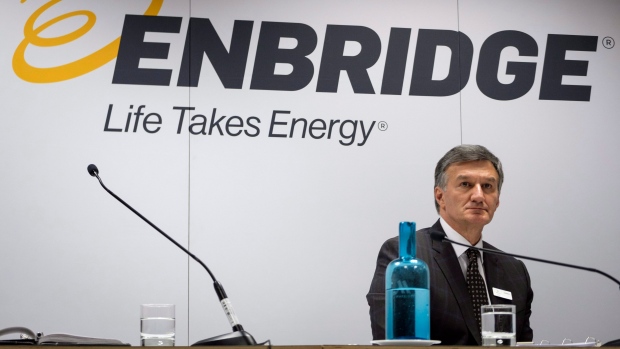May 10, 2018
'We’re confident': Enbridge CEO on asset sales, pipelines and dividend

Enbridge Chief Executive Officer Al Monaco is undaunted by his company's sliding stock price. Indeed, Monaco told BNN Bloomberg in an exclusive interview on Thursday he hasn't heard any pushback from investors in the wake of his company’s $37-billion takeover of Spectra Energy in 2016.
In the wide-ranging conversation, Monaco also pushed back on debt worries, hinted at more asset sales, and gave himself some wiggle room on Enbridge's dividend. Here are some of the highlights:
On asset sales:
“We’ve reached our 2018 target for asset sales already, so that’s helpful. We’re seeing very good indications of interest for other assets. So, to the extent that we see those values, we could accelerate further asset sales to further trim those non-core assets.”
On reports Enbridge could aim for $8 billion in asset sales this year:
“The way we’ve framed this is that the target for 2018 is $3 billion. After that, we’ll look at anything that provides real good value to us. So, we’ll look at what the value of the assets is internally, we’ll see what’s out there in terms of what people are offering. And, there’s very good interest now from strategic and financial players. It’s possible we could ramp that up.”
On the company’s sliding share price:
“I haven’t heard any pushback, actually, on the fit, or the [Spectra] deal itself. I think some of the other things that have happened in the marketplace generally certainly weighed on the energy sector in our space – interest rates [are] a good example – but, as far as the deal, it really hit all the points that we wanted to hit…
I think the Spectra deal checked all the boxes for us. And if you look back over the quarterly results you’ll see that that’s now starting to bear a lot of fruit.”
On the company’s debt levels:
“For a company like us that has large organic projects which are really solid economic projects, you do need to carry a little bit more debt. That’s partially the reason why we embarked on the asset sales, to help us secure some of that funding earlier, so we could put that capital into the core business. I think we’re managing it well. I feel like the rating agencies, and what they’ve said… I think generally we have a good position financially, as well.”
On Enbridge’s 10 per cent annual dividend growth plan:
“You’ve got to remember, in 2017 we put $12 billion of assets into service. That’s going to throw off a lot of cash flow. In fact, this year’s going to be a pretty strong year in terms of our cash flow growth... So, what we would say is: For this three-year period, we’re confident. Obviously, that depends on a whole bunch of things happening, but that’s the plan.”
On Line 3’s future in Minnesota:
“The [judge’s] recommendation concluded that the pipeline is needed. We’re talking about modernizing infrastructure here and in any other infrastructure business – whether it’s electricity transmission, roads, bridges – I think everyone would be applauding this modernization of infrastructure…
As to the preferred route that we have, we think it’s simply better from the perspective of Minnesota.”
On the ongoing debate about pipelines:
“It’s an uncertain environment. On the other hand, we do think that, ultimately, these projects will get done. It certainly takes longer, we’ve got to work harder, to get things done. But I think our team’s done a real good job, particularly in Minnesota…
My own view is: I think it really points to the need for our regulatory process and just the way we approach pipelines in Canada, to ensure that we’re providing the right runway for companies to invest capital and move forward with projects, especially after they’re approved…
I think this conversation we’re having – or debate, I guess – around pipelines and what’s viewed as a crisis… I think that’s actually going to help get people to start thinking more [about], ‘What if we don’t get this project built? What if we don’t get the other projects built?’ That’s going to have an impact and I think we’ve got to get through that phase.”
On Canadian competitiveness:
“[Investors] need to see clarity on a number of fronts and probably the biggest one in terms of the competitiveness of our industry is being able to get product to market. Obviously when that’s uncertain, big capital investments that need to happen upstream to get these resources moving are going to be more uncertain.”



